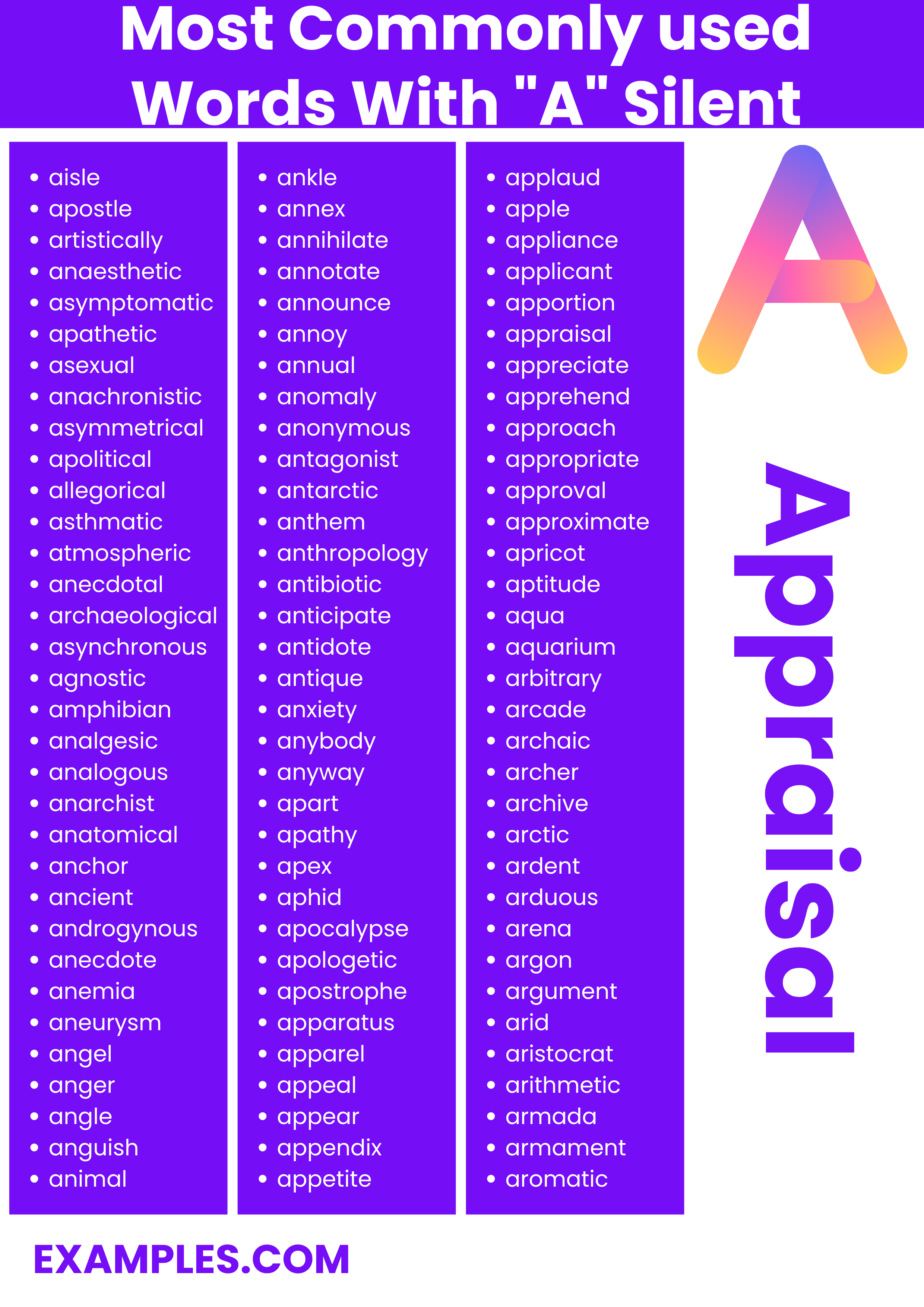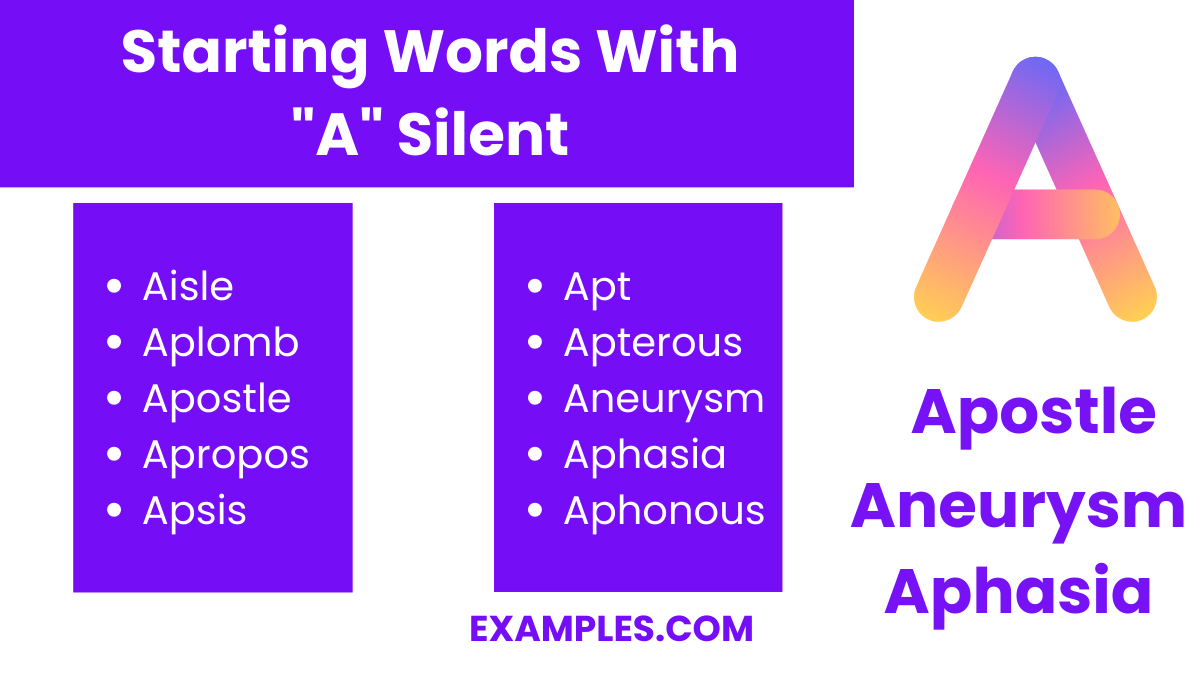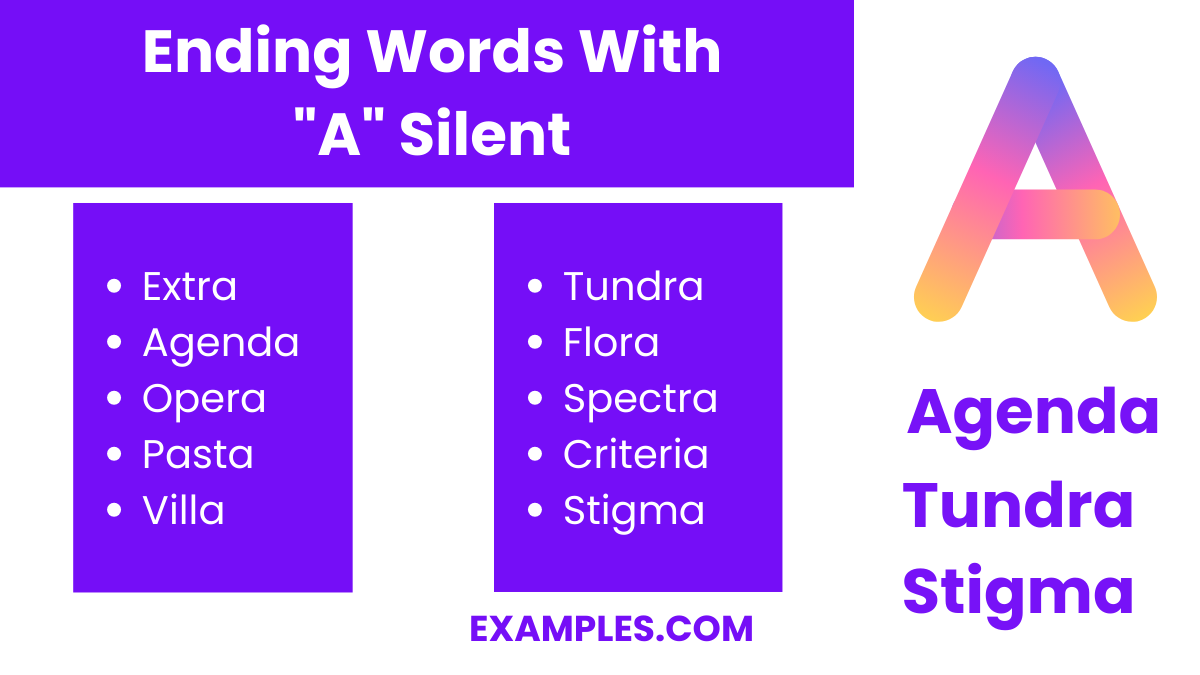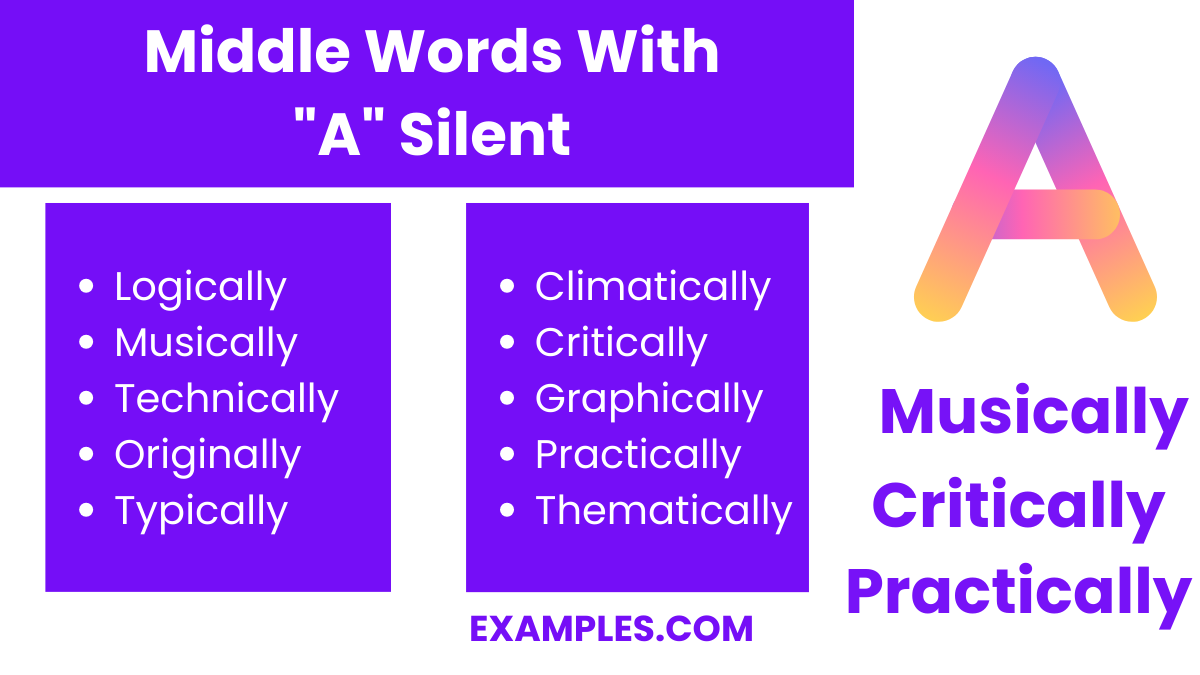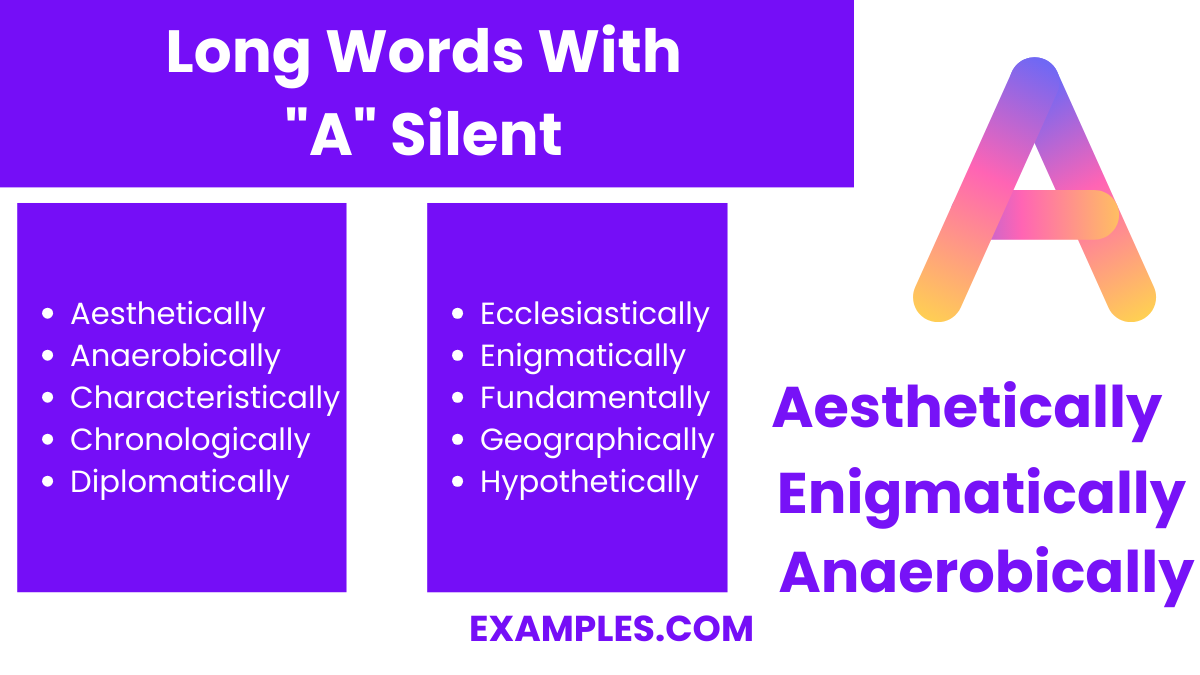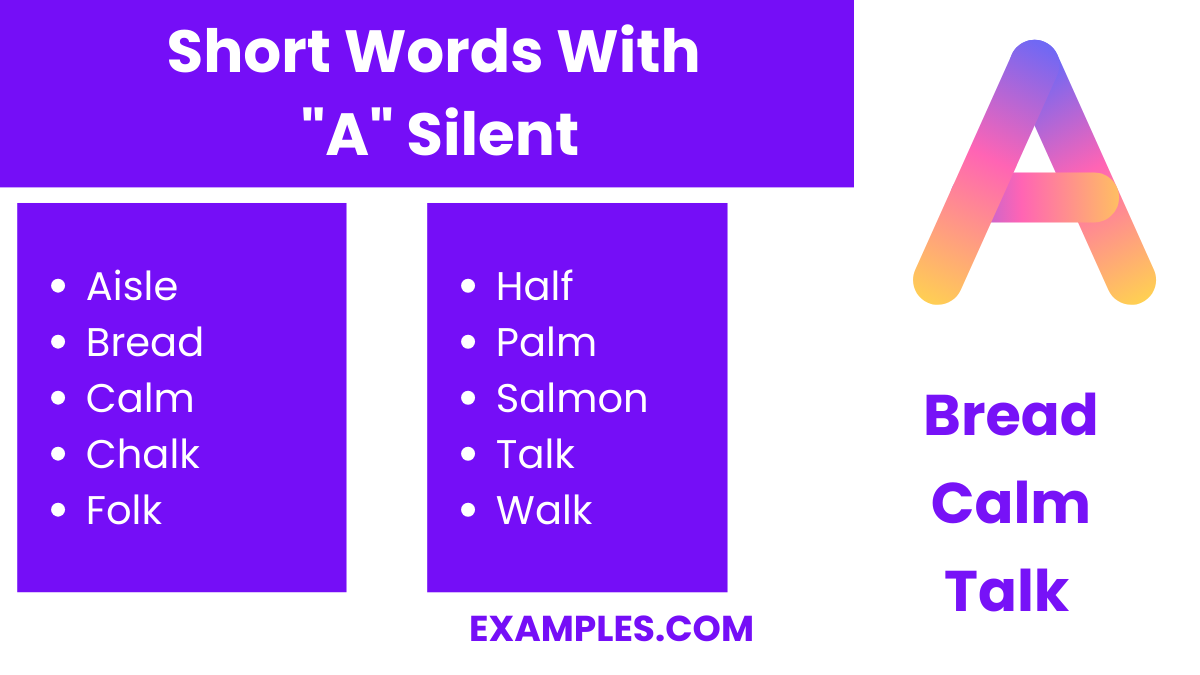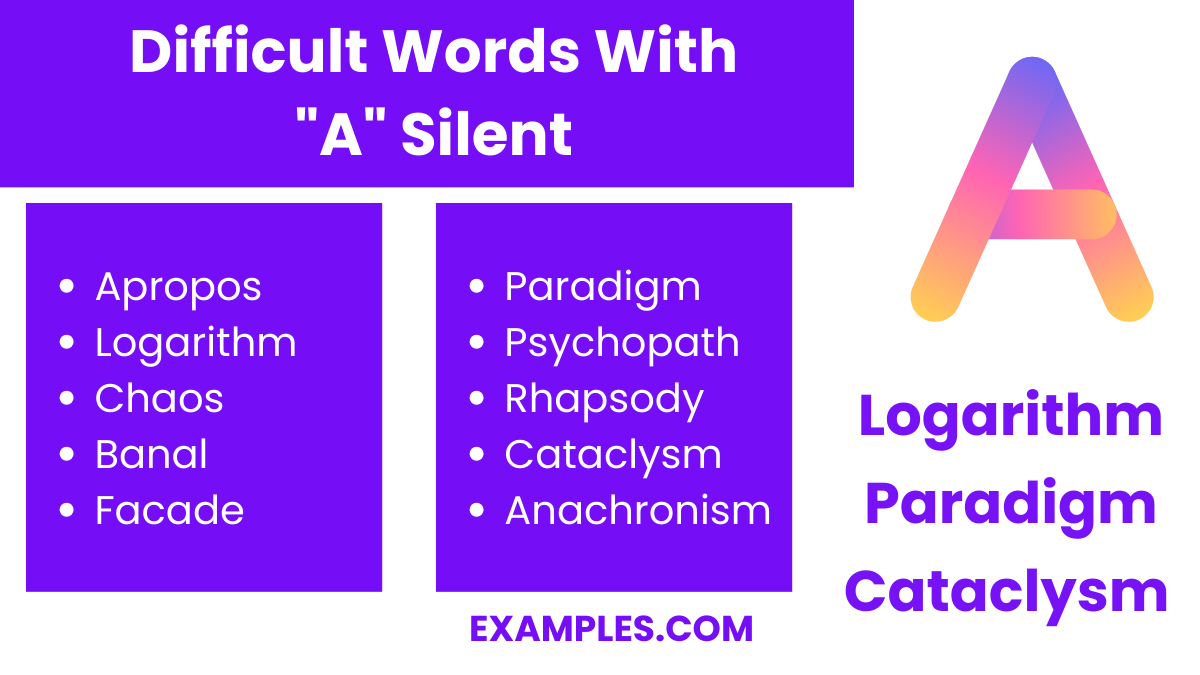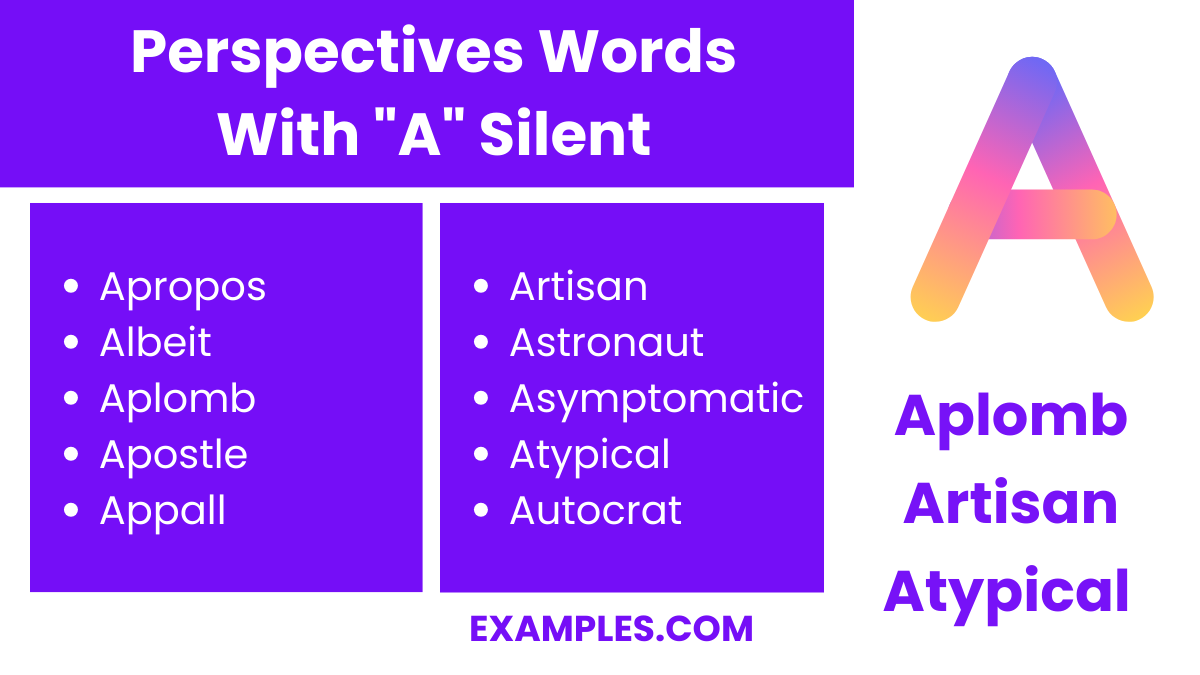450+ A Silent Words List, Meaning, PDF
In the intricate tapestry of the English language, certain words carry a unique secret: a silent ‘A’ words. This subtle phenomenon often goes unnoticed, yet it plays a crucial role in the phonetic landscape of our speech. Delving into words with a silent ‘A’ offers a fascinating glimpse into the quirks and complexities of English pronunciation, challenging the notion that every letter must make a sound. Explore these linguistic treasures to uncover the silent stories they tell, enhancing both your vocabulary and appreciation for language’s nuanced beauty.
Download Most Commonly Used Words With A Silent - PDF
200+ Most Commonly used Words With “A” Silent
Compiling a list of over 50 commonly used words with a silent “A” while ensuring variety and relevance is a detailed task. Here’s a table with a selection of such words, including their phonetic transcriptions:
| Word | Phonetic Transcription |
|---|---|
| aisle | /aɪl/ |
| apostle | /əˈpɒs.əl/ |
| artistically | /ɑːˈtɪs.tɪ.kəl.i/ |
| anaesthetic | /ˌæn.əsˈθet.ɪk/ |
| asymptomatic | /ˌeɪ.sɪmpˈtɒm.æt.ɪk/ |
| apathetic | /ˌæp.əˈθet.ɪk/ |
| asexual | /eɪˈsek.ʃu.əl/ |
| anachronistic | /əˌnæk.rəˈnɪs.tɪk/ |
| asymmetrical | /ˌeɪ.sɪˈmet.rɪ.kəl/ |
| apolitical | /ˌæp.əˈlɪt.ɪ.kəl/ |
| allegorical | /ˌæl.ɪˈɡɒr.ɪ.kəl/ |
| asthmatic | /æzˈmæt.ɪk/ |
| atmospheric | /æt.məsˈfɪr.ɪk/ |
| anecdotal | /ˌæn.ɪkˈdoʊ.təl/ |
| archaeological | /ˌɑː.ki.əˈlɒdʒ.ɪ.kəl/ |
| asynchronous | /eɪˈsɪŋ.krə.nəs/ |
| agnostic | /æɡˈnɒs.tɪk/ |
| amphibian | /æmˈfɪb.i.ən/ |
| analgesic | /ˌæn.əlˈdʒiː.zɪk/ |
| analogous | /əˈnæl.ə.ɡəs/ |
| anarchist | /ˈæn.ə.kɪst/ |
| anatomical | /ˌæn.əˈtɒm.ɪ.kəl/ |
| anchor | /ˈæŋ.kər/ |
| ancient | /ˈeɪn.ʃənt/ |
| androgynous | /ænˈdrɒdʒ.ɪ.nəs/ |
| anecdote | /ˈæn.ɪk.doʊt/ |
| anemia | /əˈniː.mi.ə/ |
| aneurysm | /ˈæn.jʊ.rɪ.zəm/ |
| angel | /ˈeɪn.dʒəl/ |
| anger | /ˈæŋ.ɡər/ |
| angle | /ˈæŋ.ɡəl/ |
| anguish | /ˈæŋ.ɡwɪʃ/ |
| animal | /ˈæn.ɪ.məl/ |
| ankle | /ˈæŋ.kəl/ |
| annex | /ˈæn.eks/ |
| annihilate | /əˈnaɪ.ə.leɪt/ |
| annotate | /ˈæn.ə.teɪt/ |
| announce | /əˈnaʊns/ |
| annoy | /əˈnɔɪ/ |
| annual | /ˈæn.ju.əl/ |
| anomaly | /əˈnɒm.ə.li/ |
| anonymous | /əˈnɒn.ɪ.məs/ |
| antagonist | /ænˈtæɡ.ə.nɪst/ |
| antarctic | /ænˈtɑːk.tɪk/ |
| anthem | /ˈæn.θəm/ |
| anthropology | /ˌæn.θrəˈpɒl.ə.dʒi/ |
| antibiotic | /ˌæn.ti.baɪˈɒt.ɪk/ |
| anticipate | /ænˈtɪs.ɪ.peɪt/ |
| antidote | /ˈæn.tɪ.doʊt/ |
| antique | /ænˈtiːk/ |
| anxiety | /æŋˈzaɪ.ə.ti/ |
| anybody | /ˈɛn.iˌbɑd.i/ |
| anyway | /ˈɛn.iˌweɪ/ |
| apart | /əˈpɑːrt/ |
| apathy | /ˈæp.ə.θi/ |
| apex | /ˈeɪ.peks/ |
| aphid | /ˈæf.ɪd/ |
| apocalypse | /əˈpɒk.ə.lɪps/ |
| apologetic | /əˌpɒl.əˈdʒet.ɪk/ |
| apostrophe | /əˈpɒs.trə.fi/ |
| apparatus | /ˌæp.əˈræt.əs/ |
| apparel | /əˈpær.əl/ |
| appeal | /əˈpiːl/ |
| appear | /əˈpɪər/ |
| appendix | /əˈpen.dɪks/ |
| appetite | /ˈæp.ɪ.taɪt/ |
| applaud | /əˈplɔːd/ |
| apple | /ˈæp.əl/ |
| appliance | /əˈplaɪ.əns/ |
| applicant | /ˈæp.lɪ.kənt/ |
| apportion | /əˈpɔː.ʃən/ |
| appraisal | /əˈpreɪ.zəl/ |
| appreciate | /əˈpriː.ʃi.eɪt/ |
| apprehend | /ˌæp.rɪˈhend/ |
| approach | /əˈproʊtʃ/ |
| appropriate | /əˈproʊ.pri.ət/ |
| approval | /əˈpruː.vəl/ |
| approximate | /əˈprɒk.sɪ.mət/ |
| apricot | /ˈeɪ.prɪ.kɒt/ |
| aptitude | /ˈæp.tɪ.tuːd/ |
| aqua | /ˈæk.wə/ |
| aquarium | /əˈkweə.ri.əm/ |
| arbitrary | /ˈɑː.bɪ.trər.i/ |
| arcade | /ɑːˈkeɪd/ |
| archaic | /ɑːˈkeɪ.ɪk/ |
| archer | /ˈɑː.tʃər/ |
| archive | /ˈɑː.kaɪv/ |
| arctic | /ˈɑːk.tɪk/ |
| ardent | /ˈɑː.dənt/ |
| arduous | /ˈɑː.dʒu.əs/ |
| arena | /əˈriː.nə/ |
| argon | /ˈɑː.ɡɒn/ |
| argument | /ˈɑː.ɡjə.mənt/ |
| arid | /ˈær.ɪd/ |
| aristocrat | /əˈrɪs.tə.kræt/ |
| arithmetic | /əˈrɪθ.mə.tɪk/ |
| armada | /ɑːˈmɑː.də/ |
| armament | /ˈɑː.mə.mənt/ |
| aromatic | /ˌær.əˈmæt.ɪk/ |
| array | /əˈreɪ/ |
| arrears | /əˈrɪərz/ |
| arrest | /əˈrest/ |
| arrival | /əˈraɪ.vəl/ |
| arrogant | /ˈær.ə.ɡənt/ |
| arrow | /ˈær.oʊ/ |
| arsenal | /ˈɑːr.sə.nəl/ |
| arson | /ˈɑːr.sən/ |
| artery | /ˈɑːr.tər.i/ |
| article | /ˈɑːr.tɪ.kəl/ |
| artisan | /ˈɑːr.tɪ.zæn/ |
| artist | /ˈɑːr.tɪst/ |
| ascend | /əˈsend/ |
| ascertain | /ˌæs.əˈteɪn/ |
| ascribe | /əˈskraɪb/ |
| ashamed | /əˈʃeɪmd/ |
| aside | /əˈsaɪd/ |
| askew | /əˈskjuː/ |
| aspect | /ˈæs.pekt/ |
| aspen | /ˈæs.pən/ |
| asphalt | /ˈæs.fɔːlt/ |
| aspirant | /əˈspaɪə.rənt/ |
| aspirate | /ˈæs.pɪ.reɪt/ |
| aspirin | /ˈæs.pɪ.rɪn/ |
| assailant | /əˈseɪ.lənt/ |
| assassin | /əˈsæs.ɪn/ |
| assault | /əˈsɔːlt/ |
| assemble | /əˈsembəl/ |
| assent | /əˈsent/ |
| assert | /əˈsɜːrt/ |
| assess | /əˈses/ |
| assign | /əˈsaɪn/ |
| assist | /əˈsɪst/ |
| associate | /əˈsoʊʃiˌeɪt/ |
| assuage | /əˈsweɪdʒ/ |
| assume | /əˈsuːm/ |
| assure | /əˈʃʊər/ |
| asterisk | /ˈæs.tə.rɪsk/ |
| astonish | /əˈstɑː.nɪʃ/ |
| astound | /əˈstaʊnd/ |
| astray | /əˈstreɪ/ |
| astride | /əˈstraɪd/ |
| astringent | /əˈstrɪndʒənt/ |
| astrology | /əˈstrɑː.lə.dʒi/ |
| astronaut | /ˈæs.trəˌnɔːt/ |
| astronomy | /əˈstrɑː.nə.mi/ |
| asylum | /əˈsaɪ.ləm/ |
| asymmetric | /ˌeɪ.sɪˈmet.rɪk/ |
| atavism | /ˈæt.ə.vɪ.zəm/ |
| atheism | /ˈeɪ.θi.ɪ.zəm/ |
| athlete | /ˈæθ.liːt/ |
| atlas | /ˈæt.ləs/ |
| atmosphere | /ˈæt.məˌsfɪr/ |
| atoll | /ˈæt.ɑːl/ |
| atom | /ˈæt.əm/ |
| atonal | /eɪˈtoʊnəl/ |
| atrocious | /əˈtroʊʃəs/ |
| atrophy | /ˈæt.rə.fi/ |
| attach | /əˈtætʃ/ |
| attack | /əˈtæk/ |
| attain | /əˈteɪn/ |
| attempt | /əˈtɛmpt/ |
| attend | /əˈtɛnd/ |
| attest | /əˈtɛst/ |
| attic | /ˈæt.ɪk/ |
| attire | /əˈtaɪər/ |
| attitude | /ˈæt.ɪˌtud/ |
| attorney | /əˈtɜːr.ni/ |
| attract | /əˈtrækt/ |
| attribute | /əˈtrɪb.jut/ |
| auburn | /ˈɔː.bərn/ |
| auction | /ˈɔːk.ʃən/ |
| audacious | /ɔːˈdeɪʃəs/ |
| audible | /ˈɔː.dɪ.bəl/ |
| audience | /ˈɔː.di.əns/ |
| audit | /ˈɔː.dɪt/ |
| augment | /ɔːɡˈment/ |
| august | /ɔːˈɡʌst/ |
| aunt | /ɑːnt/ |
| aura | /ˈɔː.rə/ |
| aural | /ˈɔː.rəl/ |
| auspicious | /ɔːˈspɪʃəs/ |
| austere | /ɔːˈstɪər/ |
| authentic | /ɔːˈθɛntɪk/ |
| author | /ˈɔː.θər/ |
| authority | /ɔːˈθɒr.ɪ.ti/ |
| authorize | /ˈɔː.θə.raɪz/ |
| autism | /ˈɔː.tɪ.zəm/ |
| auto | /ˈɔː.toʊ/ |
| autobiography | /ˌɔː.toʊ.baɪˈɒɡ.rə.fi/ |
| autocracy | /ɔːˈtɒk.rə.si/ |
| autograph | /ˈɔː.tə.ɡræf/ |
| automate | /ˈɔː.tə.meɪt/ |
| automatic | /ˌɔː.təˈmæt.ɪk/ |
| automobile | /ˈɔː.tə.moʊ.biːl/ |
| autonomous | /ɔːˈtɒn.ə.məs/ |
| autopilot | /ˈɔː.tə.paɪ.lət/ |
| autopsy | /ˈɔː.təp.si/ |
| autumn | /ˈɔː.təm/ |
| auxiliary | /ɔːɡˈzɪl.i.ə.ri/ |
| avail | /əˈveɪl/ |
| avalanche | /ˈæv.ə.lɑːntʃ/ |
| avarice | /ˈæv.ə.rɪs/ |
| avenge | /əˈvɛndʒ/ |
| avenue | /ˈæv.əˌnjuː/ |
| average | /ˈæv.ər.ɪdʒ/ |
| averse | /əˈvɜːrs/ |
| avert | /əˈvɜːrt/ |
| aviary | /ˈeɪ.vi.ə.ri/ |
| aviation | /ˌeɪ.viˈeɪ.ʃən/ |
| avid | /ˈæv.ɪd/ |
| avocado | /ˌæv.əˈkɑː.doʊ/ |
| avoid | /əˈvɔɪd/ |
| avow | /əˈvaʊ/ |
| await | /əˈweɪt/ |
| awake | /əˈweɪk/ |
| award | /əˈwɔːrd/ |
| aware | /əˈweər/ |
| awash | /əˈwɒʃ/ |
| away | /əˈweɪ/ |
| awe | /ɔː/ |
| awesome | /ˈɔː.səm/ |
| awful | /ˈɔː.fəl/ |
| awkward | /ˈɔː.kwərd/ |
| awning | /ˈɔː.nɪŋ/ |
| awry | /əˈraɪ/ |
| axiom | /ˈæk.si.əm/ |
| axis | /ˈæk.sɪs/ |
| axle | /ˈæk.səl/ |
| azalea | /əˈzeɪ.li.ə/ |
| azure | /ˈæʒ.ər/ |
This selection, though not exhaustive, provides a diverse array of words with a silent “A”, illustrating the phonetic intricacies and richness of English pronunciation.
Starting Words With “A” Silent
Diving into the realm of English phonetics reveals fascinating anomalies, one of which is the occurrence of a silent “A” at the beginning of certain words. This linguistic feature not only enriches the language’s diversity but also poses a unique challenge for learners. For educators, these words offer an excellent opportunity to explore daily use English words pronunciation nuances, enhancing students’ understanding and mastery of the language. Below is a curated list of words starting with a silent “A,” complete with phonetic transcriptions and simple definitions, tailored to assist teachers in guiding their students through the intriguing landscape of English phonetics.
- Aisle (aɪl) – A passage between rows of seats in a building such as a church or theater, an airplane, or a train.
- Aplomb (əˈplɒm) – Complete and confident composure or self-assurance.
- Apostle (əˈpɒsəl) – Each of the twelve chief disciples of Jesus Christ.
- Apropos (ˌæprəˈpoʊ) – Very appropriate to a particular situation.
- Apsis (ˈæpsɪs) – An architectural term referring to a semicircular recess covered with a hemispherical vault or semi-dome.
- Apt (æpt) – Appropriate or suitable in the circumstances.
- Apterous (ˈæptərəs) – Without wings.
- Aneurysm (ˈænjəˌrɪzəm) – An excessive localized enlargement of an artery caused by the weakening of the artery wall.
- Aphasia (əˈfeɪʒə) – Loss of ability to understand or express speech, caused by brain damage.
- Aphonous (ˈæfənəs) – Lacking sound or voice; voiceless.
Ending Words With “A” Silent
The silent “A” at the end of words is a distinctive characteristic that often reflects the etymological roots of the English language, borrowing from Latin, Greek, and other languages. This subtle linguistic feature not only enriches vocabulary with both singular and plural words but also adds depth to the pronunciation, offering a unique challenge to learners. For educators, understanding and teaching these words, including their rhyming counterparts, can greatly enhance students’ phonetic skills and appreciation for language diversity. Here’s a selection designed to illuminate this aspect of English pronunciation, aiding teachers in crafting engaging and informative lessons that explore the interplay between silent endings and their audible rhyming words, further enriching the linguistic experience.
- Extra (ˈɛkstrə) – Beyond or more than what is usual, expected, or necessary.
- Agenda (əˈdʒɛndə) – A list of items to be discussed at a formal meeting.
- Opera (ˈɒpərə) – A dramatic work in one or more acts, set to music for singers and instrumentalists.
- Pasta (ˈpæstə) – A dish originally from Italy consisting of dough made from durum wheat and water, extruded or stamped into various shapes and typically cooked in boiling water.
- Villa (ˈvɪlə) – A large and luxurious country residence.
- Tundra (ˈtʌndrə) – A vast, flat, treeless Arctic region of Europe, Asia, and North America in which the subsoil is permanently frozen.
- Flora (ˈflɔːrə) – The plants of a particular region, habitat, or geological period.
- Spectra (ˈspɛktrə) – Plural form of spectrum, used to describe a band of colors, as seen in a rainbow, produced by separation of the components of light by their different degrees of refraction.
- Criteria (kraɪˈtɪəriə) – A principle or standard by which something may be judged or decided.
- Stigma (ˈstɪɡmə) – A mark of disgrace associated with a particular circumstance, quality, or person.
Middle Words With “A” Silent
Middle words with a silent “A” underscore the idiosyncrasies and intricacies of English pronunciation and spelling, especially within the realm of consonant words, offering fascinating insights into the language’s evolution and the influence of other languages on English. These words, where the “A” is nestled silently between consonants, often trace their origins to languages like Latin, French, and Greek, reflecting centuries of linguistic interaction and assimilation.
- Logically (ˈlɒdʒɪkli) – In a way that is governed by or in accordance with reason or sound thinking.
- Musically (ˈmjuːzɪkli) – In a manner that is talented in or fond of music.
- Technically (ˈtɛknɪkli) – According to a strict application or interpretation of the law or rules.
- Originally (əˈrɪdʒɪnəli) – In the beginning; at first.
- Typically (ˈtɪpɪkli) – In a way that is characteristic of a particular person or thing.
- Climatically (klaɪˈmætɪkli) – With respect to climate.
- Critically (ˈkrɪtɪkli) – In a way that expresses adverse or disapproving comments or judgments.
- Graphically (ˈɡræfɪkli) – In a way that relates to visual art, especially involving drawing, engraving, or lettering.
- Practically (/ˈpræktɪkli/) – Almost; nearly.
- Thematically (θɪˈmætɪkli) – In a way that relates to or constitutes a theme.
Long Words With “A” Silent
Exploring long words with a silent “A” offers a window into the vast and varied landscape of English vocabulary, where describing words come to life with hidden intricacies. These words often have roots in ancient languages, carrying with them centuries of linguistic evolution. For educators, this presents an invaluable opportunity to delve into the history and complexity of English, providing students with a richer, more nuanced understanding of the language.This exploration not only enhances vocabulary but also enriches the learners’ grasp of English phonetics and etymology.
- Aesthetically (iːsˈθɛtɪkli) – In a way that gives pleasure through beauty.
- Anaerobically (ˌænɛˈroʊbɪkli) – Relating to or involving the absence of oxygen.
- Characteristically (ˌkærɪktəˈrɪstɪkli) – In a way that is typical of a particular thing or person.
- Chronologically (ˌkrɒnəˈlɒdʒɪkli) – In order of time from the earliest to the latest.
- Diplomatically (dɪˈpləʊmætɪkli) – Involving diplomacy; tactful and sensitive to others.
- Ecclesiastically (ɪˌkliːziˈæstɪkli) – Pertaining to the church or its functions and rites.
- Enigmatically (ɛˌnɪɡˈmætɪkli) – In a puzzling, mysterious, or cryptic manner.
- Fundamentally (ˌfʌndəˈmɛntəli) – In central or primary respects; at the core.
- Geographically (ˌdʒiːəˈɡræfɪkli) – In terms of the physical features of the earth.
- Hypothetically (ˌhaɪpəˈθɛtɪkli) – Based on or involving a hypothesis.
Short Words With “A” Silent
Short words with a silent “A” are jewels in the English language, offering both a challenge and a delight to those learning and teaching it. Their brevity belies their complexity, providing a perfect opportunity for educators to highlight the nuances of English pronunciation and spelling. Below is a selection of succinct words, each with the “A” silent, accompanied by their meanings and phonetic transcriptions.
- Aisle (aɪl) – A passage between rows of seats in a building, such as a church or theater.
- Bread (brɛd) – A staple food made from flour and water, usually baked.
- Calm (kɑːm) – Free from agitation, excitement, or disturbance.
- Chalk (tʃɔːk) – A soft white limestone used for writing on blackboards.
- Folk (foʊk) – People in general, or a specific group of people.
- Half (hɑːf) – Consisting of one of two equal parts.
- Palm (pɑːm) – The inner surface of the hand between the wrist and fingers.
- Salmon (ˈsæmən) – A large edible fish that is a popular food.
- Talk (tɔːk) – Engage in speech or conversation.
- Walk (wɔːk) – Move at a regular pace by lifting and setting down each foot in turn.
Difficult Words With “A” Silent
Navigating through the English language, one encounters words that not only challenge comprehension but also pronunciation, particularly those with a silent “A”. These difficult words often stem from various linguistic backgrounds, embodying the rich tapestry of English and its history of assimilation. For educators, these difficult words present a unique opportunity to delve into advanced phonetics and etymology, pushing students to expand their linguistic boundaries. This exploration fosters a deeper understanding and appreciation for the complexity of English. Below is a list of ten such challenging words, each featuring a silent “A”, along with their meanings and phonetic transcriptions, designed to enrich vocabulary and pronunciation skills.
- Apropos (ˌæprəˈpoʊ) – Relevant or appropriate to a particular matter.
- Logarithm (ˈlɔɡəˌrɪðəm) – The exponent or power to which a base, usually 10, must be raised to produce a given number.
- Chaos (ˈkeɪ.ɑs) – Complete disorder and confusion.
- Banal (bəˈnɑːl) – So lacking in originality as to be obvious and boring.
- Facade (fəˈsɑːd) – The front of a building, especially an imposing or decorative one.
- Paradigm (ˈpærəˌdaɪm) – A typical example or pattern of something; a model.
- Psychopath (ˈsaɪkəˌpæθ) – A person suffering from a chronic mental disorder with abnormal or violent social behavior.
- Rhapsody (ˈræpsədi) – An effusively enthusiastic or ecstatic expression of feeling.
- Cataclysm (ˈkætəˌklɪzəm) – A large-scale and violent event in the natural world.
- Anachronism (əˈnækrəˌnɪzəm) – Something that is not in its correct historical or chronological time, especially a thing or person that belongs to an earlier time.
Perspectives Words With “A” Silent
Words with a silent “A” from various perspectives enrich our understanding and use of the English language, highlighting its diversity and the influence of other languages on its development. For educators, these words open avenues for discussions on linguistics, phonetics, and etymology, making language learning a more engaging and insightful experience. Here are ten perspective-rich words with their silent “A,” meanings, and phonetic transcriptions.
- Apropos (ˌæprəˈpoʊ) – Very appropriate to a particular situation.
- Albeit (ɔːlˈbiːɪt) – Although.
- Aplomb (əˈplɒm) – Self-confidence or assurance, especially in a demanding situation.
- Apostle (əˈpɒsəl) – A vigorous and pioneering advocate or supporter of a particular policy, idea, or cause.
- Appall (əˈpɔːl) – Greatly dismay or horrify.
- Artisan (ˈɑːrtɪzən) – A worker in a skilled trade, especially one that involves making things by hand.
- Astronaut (ˈæstrənɔːt) – A person who is trained to travel in a spacecraft.
- Asymptomatic (ˌeɪsɪmpˈtɒmætɪk) – Producing or showing no symptoms.
- Atypical (eɪˈtɪpɪkəl) – Not representative of a type, group, or class.
- Autocrat (ˈɔːtəkræt) – A ruler who has absolute power.
In conclusion, Understanding words with a silent “A” enriches one’s grasp of English pronunciation and spelling. This exploration offers a fascinating linguistic journey, revealing the language’s complexity and beauty. For learners and educators alike, mastering these words enhances communication skills and deepens appreciation for the intricacies of English, making it an invaluable part of language learning and teaching.




